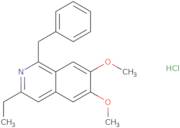Informations sur le produit
- 1-Benzyl-3-ethyl-6,7-dimethoxyisoquinoline hydrochloride
- 1-Benzyl-3-ethyl-6,7-dimethoxyisoquinoline hydrochloride (1:1)
- 1-Benzyl-6,7-dimethoxy-3-ethylisoquinoline hydrochloride
- 1163-37-7
- 214-607-5
- Eupaverin
- Eupaverin hydrochloride
- Eupaverina
- Isoquinoline, 1-benzyl-3-ethyl-6,7-dimethoxy-, hydrochloride
- Isoquinoline, 3-Ethyl-6,7-Dimethoxy-1-(Phenylmethyl)-, Hydrochloride (1:1)
- Voir d'autres synonymes
- Isoquinoline, 3-ethyl-6,7-dimethoxy-1-(phenylmethyl)-, hydrochloride
- Kollateral
- Moxaverine hydrochloride
- Paverine hydrochloride
- Sorbosan
Moxaverine hydrochloride is a prodrug that is metabolized in the liver to produce moxaverine. Moxaverine inhibits the enzyme phosphodiesterase, which breaks down cyclic adenosine monophosphate (cAMP) and leads to an increase in cAMP levels. It has been used as an experimental drug for renal transplantation as well as for treatment of inflammatory diseases and autoimmune diseases. Moxaverine hydrochloride has low bioavailability and is not active when taken orally. Studies have shown that it is more effective when administered intravenously or intraperitoneally.
Moxaverine hydrochloride has been shown to inhibit creatine kinase activity in vitro at concentrations of 1-10 μM. The enzyme activity was inhibited by approximately 50% at 10 μM concentration, which led to a decrease in cell proliferation in cell culture. This inhibition of creatine kinase may be responsible for its inhibitory effect on inflammation and autoimmune disease activity.





